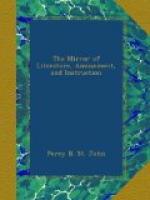the reaping commences after breakfast, which is seldom
over till between eight and nine o’clock.
This company is open for additional hands to drop
in at any time before the twelfth hour to partake
of the frolic of the day. By eleven or twelve
o’clock the ale or cider has so much warmed
and elevated their spirits that their noisy jokes
and ribaldry are heard to a considerable distance,
and often serve to draw auxiliary force within the
accustomed time. The dinner, consisting of the
best meat and vegetables, is carried into the field
between twelve and one o’clock; this is distributed
with copious draughts of ale and cider, and by two
o’clock the pastime of cutting and binding the
wheat is resumed, and continued, without other interruption
than the squabbles of the party, until about five o’clock;
when what is called the drinkings are taken into the
field, and under the shade of a hedge-row, or large
tree, the panniers are examined, and buns, cakes,
and all such articles are found as the confectionary
skill of the farmer’s wife could produce for
gratifying the appetites of her customary guests at
this season. After the drinkings are over, which
generally consume from half to three quarters of an
hour, and even longer, if such can be spared from
the completion of the field, the amusement of the
wheat harvest is continued, with such exertions as
draw the reaping and binding of the field together
with the close of the evening. This done, a small
sheaf is bound up, and set upon the top of one of
the ridges, when the reapers retiring to a certain
distance, each throws his reap-hook at the sheaf,
until one more fortunate, or less inebriated, than
the rest strikes it down; this achievement is accompanied
with the utmost stretch and power of the voices of
the company, uttering words very indistinctly, but
somewhat to this purpose—
we ha in! we
ha in! we ha in!—which noise and tumult
continue about half an hour, when the company retire
to the farmhouse to sup; which being over, large portions
of ale and cider enable them to carouse and vociferate
until one or two o’clock in the morning.
At the same house, or that of a neighbouring farmer,
a similar scene is renewed, beginning between eight
and nine o’clock in the morning following, and
so continued through the precious season of the wheat
harvest in this county. It must be observed that
the labourers thus employed in reaping receive no
wages; but in lieu thereof they have an invitation
to the farmer’s house to partake of a harvest
frolic, and at Christmas, during the whole of which
time, and which seldom continues less than three or
four days, the house is kept open night and day to
the guests, whose behaviour during the time may be
assimilated to the frolics of a bear-garden.
* * * *
*
SPIRIT OF THE PUBLIC JOURNALS.
* * * *
*
THE BULL-FIGHTS OF SPAIN AND PORTUGAL.




